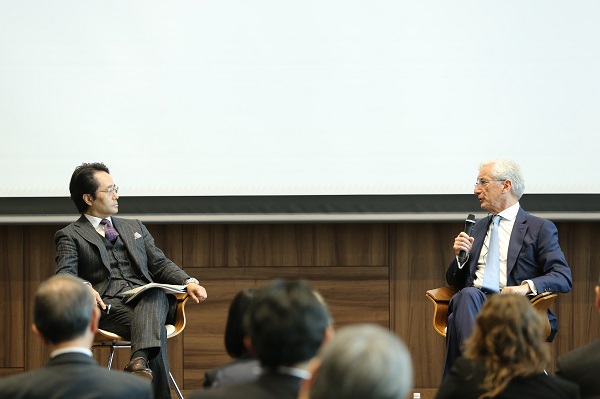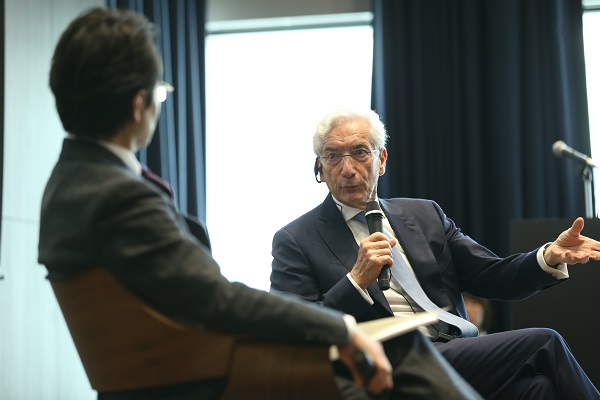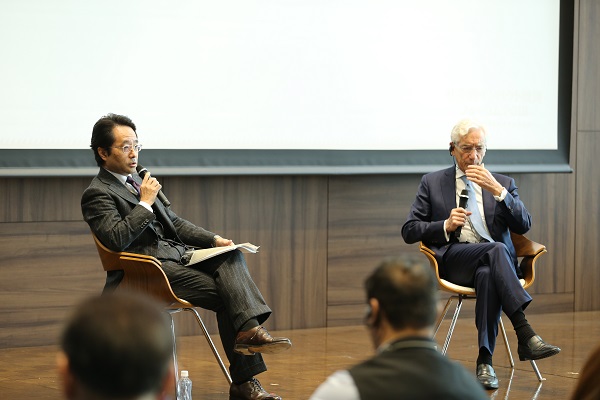Nishimura: SDGs are 17 Sustainable Development Goals adopted by the United Nations to resolve issues in areas including the environment, gender and poverty. The goals are supposed to be achieved by 2030. On the other hand, Sir Ronald sets the year of turning point for social impact investment as 2020. How do the U.N. development goals relate to impact investment? Why and how is the year 2020 going to be a turning point? Can you share your vision?
Cohen: By 2020, we will be reaching a crossroad with rapid market growth. There is some evidence to suggest that we are already nearing the crossroad. We will approach even closer if outcome-payment funds are set up in Japan, India and Africa and start drawing a substantial amount of money.
If Japan's pension fund chose to allocate 5 - 10% of its fund toward social impact investment and created a system covering ESG considerations (investment with emphasis on environmental, social and governance criteria), that would also be a strong push toward the crossroad.
The U.S. Ford Foundation has already allocated one billion US dollars. If fifty foundations adopted the same policy, the rest would follow suit. If helping poverty-stricken families can generate investment returns, we will be able to help even a greater number of families.
There is a USD 30 trillion shortfall in funding to achieve the United Nations' development goals. That translates into a shortfall of approx. USD 2.5 trillion per year. That is why we must get large corporations involved. More large corporations must participate. They must think what they can do toward improving social and environmental issues. By 2030, laws will be pushing businesses into this direction. There comes a time when they could no longer talk only about making money.
Nishimura: Britain was ahead of Japan in starting the use of unclaimed fund in dormant accounts. Japan is launching the system in the fall of next year. Advance examples around the world are seen in Britain and South Korea, but I have heard that the system is not working well in South Korea. Can you tell us why it is working in Britain and what the key to success has been, along with your advice to Japan?
Cohen: Britain has a dormant deposit utilization fund called Big Society Capital. I am one of its co-founders. It started with the capital investment of 600 million pounds, including 400 million pounds that came from dormant accounts. If we invest, others will join in, doubling or even tripling the investment. Tapping into fund in dormant accounts will create a very large opportunity for Japan.
If Japan sets up an outcome-payment fund and attracts investments, other investors will definitely follow suit. Investments will come also from pension funds and foundation funds to generate a synergistic effect. The influx of fund into the fund would make it possible to broaden the range of issues to be addressed, including youth unemployment and aged care. It is important to create such an ecosystem.
The key is to set up impact investment managers. In the case of Britain, there are around 40 organizations managing impact investments.
Nishimura: How do you connect Millennial entrepreneurs with existing financial organizations?
Cohen: I see young entrepreneurs in the Millennial generation every day. They bring suggestions about projects for helping specific groups of people. Various people are devising various projects every day for supporting poverty-stricken families, for example. They want to earn money and do something good at the same time to improve our society. The problem is the scarcity of available fund.
Nishimura: Today, Sir Ronald has shared a lot of his in-depth insight based on his personal experiences. I hope he will maintain his passion and continue to communicate with Japanese entrepreneurs, financial institutes, government and media. Thank you very much.


